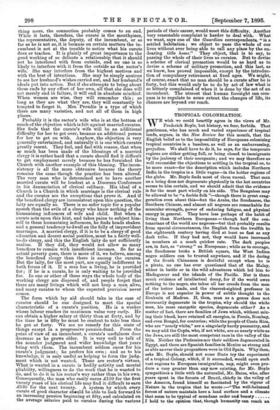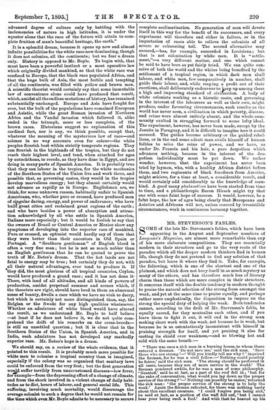TROPICAL COLONISATION.
WE wish we could heartily agree in the views of Mr. Frederick Boyle, but history, we fear, forbids. That gentleman, who has much and varied experience of tropical lands, argues, in the New Review for this month, that the English belief as to the impossibility of Europeans colonising tropical countries is a baseless, as well as an embarrassing, prejudice. We shall have to do it, he says, for the temperate regions are either getting full, or being closed to immigrants by the jealousy of their occupants; and we may therefore as well reconsider the objections to settling in the tropical or, to be more exact—for the description which includes Northern India in the tropics is a little vague—in the hotter regions of the globe. Mr. Boyle finds most of them unreal. That man as a being does not degenerate physically in the hot countries seems to him certain, and we should admit that the evidence is for the most part wholly on his side. The Bengalees may be allowed to be "a feeble folk "—though there is great exag- geration even about this—but the Arabs, the Soudanese, the Southern Chinese, and almost all negroes are remarkable for muscular strength, power of enduring fatigue, and physical energy in general. They have less perhaps of the habit of living than Northern Europeans—though half the cen- tenarians of the world are negroes—but that probably results from special circumstances, the English from the twelfth to the eighteenth century having died at least as fast as any dark tribe. If they had not, they would have increased in numbers at a much quicker rate. The dark peoples are, in fact, as "strong" as Europeans ; while as to courage, the Soudanese broke a British square, the West Indian negro soldiers can be trusted anywhere, and if the daring of the Soath Chinaman is doubtful except when he is a pirate, no one has ever questioned that of the Malay, either in battle or in the wild adventures which led him to Madagascar and the islands of the Pacific. Nor is there much evidence of intellectual decay, for if the world owes nothing to the negro, she takes all her creeds from the men of the hotter lands, and the clearest-sighted professor in Europe is not superior in power of subtle thought to the Brahmin of Madras. If, then, man as a genus does not necessarily degenerate in the tropics, why should the white man, his most energetic species, degenerate either P As a matter of fact, there are families of Jews which, without mix- ing their blood, have retained all energies, in Persia, Bombay, and even Bengal, for centuries; while the people of Costa Rica, who are "nearly white," are a singularly hardy peasantry, and we may add the Copts, who, if not white, are as nearly white as the Jews, are still the most competent race in the valley of the Nile. Neither the Ptolemies nor their soldiers degenerated in Egypt, and there are Spanish families in Mexico as strong and as able as ever their progenitors were in Old Spain. Why then, asks Mr. Boyle, should not some State try the experiment of a tropical Colony, which, if it succeeded, would open such vast regions to European immigration, nay, might even pro- duce a race greater than any now existing, for Mr. Boyle sympathise's a little with the naturalist, Mr. Bates, who, after years spent in the forests of Brazil, chiefly in the valley of the Amazon, found himself so fascinated by the vigour of Nature in the tropics that he wrote :—" The well-balanced forces of nature maintain here a land surface and a climate
that seem to be typical of mundane order and beauty I hold to the opinion that, though humanity can reach an advanced degree of culture only by battling with the inclemencies of nature in high latitudes, it is under the equator alone that the race of the future will attain to com- plete fruition of man's beautiful heritage, the earth."
It is a splendid dream, because it opens up new and almost infinite possibilities for the white race now dominating, though it does not colonise, all the continents; but we fear a dream only. History is opposed to Mr. Boyle. To begin with, that must have been a powerful instinct or a most operative law which originally divided mankind, so that the white race was confined to Europe, that the black race populated Africa, and that the huge bulk of Asia, the most fertile and tempting of all the continents, was filled with yellow and brown men. A scientific theorist would certainly say that some immutable law of convenience alone could have produced that result, which, amidst all the endless mutations of history, has remained substantially unchanged. Europe and Asia have fought for ever, but the bulk of the populations have remained European and Asiatic, while the great Roman invasion of Northern Africa and the Vandal invasion which followed it, alike ended in the triumph, more or less complete, of the brown races. Historians suggest no explanation of this cardinal fact, nor is any, we think possible, except that, whatever the meaning of the mysterious law of race—and science in no way accounts even for colour—the white peoples flourish best within strictly temperate regions. They can flourish in the highlands of the tropics, but they do not reach their highest level, and tend, when attacked for ages by autochthons, to recede, as they have done in Egypt, and are doing in many parts of Spanish America. It is probably true that they can labour in the tropics, for the white mechanics of the Southern States of the Union live and work there, and possible that, as governing castes, they would in the tropics develop marvellous energy ; but they almost certainly would not advance as rapidly as in Europe. Englishmen are, we think, for some unknown reason, habitually unfair to Spanish Americans, who, whether pure or crossed, have produced men of singular daring, energy, and power of endurance; who have built great cities and reclaimed great regions of the earth ; and who have besides a power of absorption and attrac- tion acknowledged by all who settle in Spanish America, Italians more especially ; but it would be foolish to say that the owners of Brazil or Central America or Mexico show any symptoms of developing into the superior race of mankind. Pure or crossed, an optimist would hardly say of them that they were better than their ancestors in Old Spain or Portugal. A " Southern gentleman" of English blood is often a very fine man ; but he is not so much nobler than an English gentleman that he can be quoted to prove the truth of Mr. Bates's dream. That the hot lands are not fatal to energy may be true ; but certainly they do not, with all their natural advantages, ever tend to produce it. If they did, the most glorious of all tropical countries, Ceylon, would have produced a grand race ; and it has not done it• There, with land of all altitudes, and all kinds of powers of production, amidst perpetual summer and scenes which, if the theorists are right, should have bred in them an abnormal sense of beauty, dwells a race which we have no wish to decry, but which is certainly not more distinguished than, say, the Belgian or the Swede for any high qualities whatsoever. Whether an admixture of white blood would have altered the result, as we understand Mr. Boyle to half believe —at least if he does not believe it, we do not quite com- prehend the drift of his remarks on the cross-breeds- is still an unsettled question ; but it is clear that in the Southern States of the Union, in Spanish America, and in India, such admixture has not developed any markedly superior race. Mr. Bates's hope is a dream.
We should say, on a review of the whole evidence, that it pointed to this result. It is probably much more possible for white men to colonise a tropical country than is imagined, especially if the colony was so organised that sanitary laws could be enforced from the very first ; but the first generation woad suffer terribly from unaccustomed diseases—low fever, for example—from the depressing effect of a change of climate, and from the shock involved in a violent change of daily habi- tudes as to diet, hours of labour, and general social life. This suffering, involving much mortality, would discourage the average colonist to such a degree that he would not remain for the time which even Mr. Boyle admits to be necessary to secure complete acclimatisation. No generation of men will devote itself in this way for the benefit of its successors, and every experiment will therefore end either in failure, or in the importation of races able to relieve the colonists of all severe or exhausting toil. The second alternative may succeed,—has, for example, succeeded in Louisiana ; but that is not colonisation by white men. It is " settle- ment,"—a very different matter, and one which cannot be said to have been as yet fairly tried. We can quite con- ceive of both the world and the whites being benefited by the settlement of a tropical region, in which dark men shall labour, and white men, few comparatively in number, shall guide their labour, and, while reaping a profit out of their exertions, shall deliberately endeavour to keep up among them a high and improving standard of civilisation. A body of white colonists working as a hieratic caste, and governing in the interest of the labourers as well as their own, might produce, under favouring circumstances, such results as the world has never seen, a civilisation in which poverty, disease, and crime were almost entirely absent, and the whole com- munity exulted in struggling forward to some lofty ideal. The experiment, however, has never been made, except by the Jesuits in Paraguay, and it is difficult to imagine how it could succeed. The guides become arbitrary or the guided rebel- lious, or in the end some adroit man avails himself of human foibles to seize the reins of power, and we have, as under Dr. Francia and his heir, a pure despotism which advances nothing, because in the interest of the des- potism individuality must be put down. We rather wonder, however, that the experiment has never been tried by laymen, who, with a healthy African district before them, and two regiments of black freedmen from America, might achieve, for a time at least, a considerable result, and would certainly add considerably to the knowledge of man- kind. A good many phalansteres have been started from time to time, and a philanthropic Baron Hirsch might try that one with some faint hope of success. It would, however, be a faint hope, the law of ages being clearly that Buropeans and Asiatics and Africans will not, unless coerced by irresistible circumstances, work in continuous harmony together.



































 Previous page
Previous page